| Information
Service of
the Serbian Orthodox Church
April 18,
2005

COMMUNIQUE
FROM THE JOINT SESSION OF THE HOLY SYNOD OF BISHOPS AND THE HOLY
ASSEMBLY OF BISHOP’S COUNCIL FOR KOSOVO AND METOHIJA
A
joint session of the Holy Synod of Bishops of the Serbian Orthodox
Church and the Holy Assembly of Bishop’s Council for Kosovo and
Metohija with His Holiness Serbian Patriarch Pavle presiding,
was held today in the Patriarchate in Belgrade.
The
Holy Synod of Bishops and the Holy Assembly of Bishop’s Council
for Kosovo and Metohija heard the report of His Grace Bishop Grigorije
of Zahumlje and Herzegovina and the members of the delegation
of the Holy Synod which visited the United States of America from
March 25 to April 16, 2005, and adopted it in full and in detail.
All
participants in today’s meeting assessed that the delegation faithfully
represented the positions of the Holy Synod of Bishops and the
Council for Kosovo and Metohija before all collocutors in the
USA.
The
participants concluded that the Serbian Orthodox Church will continue
to work on the implementation of these established principles
of action with respect to the survival of the Serbian Orthodox
Church and Serbian people in Kosovo and Metohija, as follows:
1.
Protection of elementary human rights for Serbs and all who
live in Kosovo and Metohija, which should be based on equality
of all citizens;
2. Return of all displaced persons and their survival and incorporation
into all aspects of social, economic and cultural life;
3. Return of nationalized church property;
4. Restoration of all churches, monasteries and other church
buildings destroyed since the arrival of the international mission
in 1999;
5. For the purpose of implementing and bringing to life the
Memorandum on understanding on agreed general principles for
the restoration of Serbian Orthodox Church holy sites in Kosovo
and Metohija, the Holy Synod of Bishops appointed His Grace
Bishop Teodosije of Lipljan, the abbot of Visoki Decani Monastery,
as the representative of the Serbian Orthodox Church in the
Commission foreseen by this Memorandum;
6. Resumption of dialogue with representatives of the Islamic
religious community, as well as other Churches and religious
communities in Kosovo and Metohija;
7. Readiness of the Serbian Orthodox Church for cooperation
and constructive dialogue with all international institutions
able to contribute to peace and stability in Kosovo and Metohija,
Bosnia and Herzegovina, and all of Southeastern Europe.

PATRIARCH
PAVLE MEETS WITH OLLI REHN,
EU COMMISSIONER FOR ENLARGEMENT
 His
Holiness Serbian Patriarch Pavle, together with His Eminence Metropolitan
Amfilohije of Montenegro and the Littoral and His Grace Bishop
Jovan of Sumadija, met today with Olli Rehn, the European Union
Commissioner for Enlargement, in the Belgrade Patriarchate. His
Holiness Serbian Patriarch Pavle, together with His Eminence Metropolitan
Amfilohije of Montenegro and the Littoral and His Grace Bishop
Jovan of Sumadija, met today with Olli Rehn, the European Union
Commissioner for Enlargement, in the Belgrade Patriarchate.
In
the course of cordial discussion Olli Rehn thanked His Holiness
for his personal engagement in spreading tolerance in Serbia and
Montenegro, and he also thanked the Serbian Orthodox Church for
signing the Memorandum of understanding. Mr. Rehn emphasized that
the European Union will try to restore all monasteries and churches
that have been destroyed or damaged in Kosovo and Metohija and
that it will seek to keep Kosovo and Metohija a multiethnic and
multiconfessional environment. Mr. Rehn was informed that at its
most recent meeting, the Holy Synod of Bishop had appointed His
Grace Vicar Bishop Teodosije of Lipljan as its member in the joint
commission for implementation of the Memorandum on understanding.
At the end of the discussion, Mr. Rehn thanked the Serbian Orthodox
Church for helping the state on the path to European integration.

“LET
US BREATHE LIFE INTO SERBIA”
PASCHAL BENEFIT CONCERT
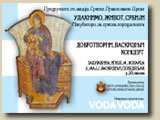 The
Holy Synod of Bishops of the Serbian Orthodox Church launched
the “Let us breathe life into Serbia” campaign in 2001 and has
been conducting it for the past five years with the sponsorship
of His Holiness Serbian Patriarch Pavle. The basic goal of the
campaign is to provide desperately needed incubators for prematurely
born children to all maternity wards in Serbia, as well as other
equipment. The
Holy Synod of Bishops of the Serbian Orthodox Church launched
the “Let us breathe life into Serbia” campaign in 2001 and has
been conducting it for the past five years with the sponsorship
of His Holiness Serbian Patriarch Pavle. The basic goal of the
campaign is to provide desperately needed incubators for prematurely
born children to all maternity wards in Serbia, as well as other
equipment.
In
the past three years infant mortality, especially for prematurely
born children, has reduced by half, we believe in part thanks
to this campaign. During this period 77 stationary incubators,
3 transporter incubators, 17 phototherapy devices, 15 patient
monitors, 9 pulse oximeters, 3 sterilizers, 1 respiratory machine,
1 suction set and 1 bilirubinometer were distributed.
Serbia
still has an infant mortality rate of more than 9 percent, whereas
infant mortality in Western Europe varies between 3 and 5 percent.
The basic cause of this tragic situation in our country is the
lack of incubators and other equipment in the maternity wards.
During the current year, we wish to provide incubators to as great
a number of medical institutions as possible.
In
order to remind and caution Serbian society of the necessity of
obtaining additional neonatal devices, the Holy Synod of Bishops
of the Serbian Orthodox Church has been organizing the “Let us
breathe life into Serbia” paschal benefit concert every year.
This year the traditional concert will be held on the second day
of Pascha, May 2, 2005, in the concert hall at Kolarceva Zaduzbina.
His Holiness Patriarch Pavle will be attending the concert, as
well as other eminent figures from the life of the Church and
Serbian society.
Performers
will include Katarina Radivojevic, Marija Karan, Kalina Kovacevic;
the groups Teodulija, Belo Platno and Gora; and the choirs of
the monastery of Kovilj, Mojsije Petrovic and the Church of the
Holy Trinity in Zemun. The general sponsor of the concert is VODA
VODA.
All
proceeds from ticket sales will be used to purchase incubators.
The entire concert will be inspired by the spirit of the most
joyous holiday of holidays – Pascha.

6O-YEAR
ANNIVERSARY OF BREAK OUT OF JASENOVAC CONCENTRATION CAMP PRISONERS,
VICTORY AGAINST FASCISM AND THE HOLOCAUST COMMEMORATED IN DONJA
GRADINA
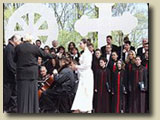 The
60-year anniversary commemoration of the break out of Jasenovac
concentration camp prisoners, victory against fascism and the
Holocaust was held on April 17, 2005, in Donja Gradina, the biggest
killing field in the Jasenovac concentration camp system where
366,000 Serbs, Jews, Roma and other patriots perished under hideous
conditions. The
60-year anniversary commemoration of the break out of Jasenovac
concentration camp prisoners, victory against fascism and the
Holocaust was held on April 17, 2005, in Donja Gradina, the biggest
killing field in the Jasenovac concentration camp system where
366,000 Serbs, Jews, Roma and other patriots perished under hideous
conditions.
His
Grace Bishop Jefrem of Banja Luka served Holy Hierarchal Liturgy
in the church of the Holy Apostles Peter and Paul in Kozarska
Dubica with the concelebration of the clergy of the Diocese of
Banja Luka, and in the presence of several bishops of the Serbian
Orthodox Church. After Holy Hierarchal Liturgy candles were lit,
and wreaths and flowers placed on the memorial plate at the Topole
cemetery in Donja Gradina.
His
Eminence Metropolitan Nikolaj of Dabro-Bosnia served a memorial
service for the victims of Jasenovac with the concelebration of
His Grace Bishop Grigorije of Zvornik and Tuzla in the presence
of approximately 10,000 citizens and faithful at the Kostute cemetery.
“During World War II in this region and beyond it, Serbs, Jews
and Roma were taken from their warm homes to the concentration
camps and killed in various fashion, both in Jasenovac and here
in Donja Gradina without knowing why and whom they had offended,”
said Metropolitan Nikolaj. He added that the memorial service
and other events today are to mark the 60-year anniversary of
the break out from Jasenovac “by the few surviving prisoners who
did not share the fate of the 700,000 innocents tortured and killed.”
A
prayer for the victims of the Holocaust and Kaddish, the Jewish
mourners' prayer, was led by Rabbi Isak Asiel from Belgrade. Rabbi
Asiel recalled the horrible tragedy of the Jewish people throughout
Europe during World War II and expressed the hope that such monstrous
crimes will never again be repeated. Prayers for Roma victims
were led by Dragoljub Ackovic, a representative of the World Congress
of Roma.
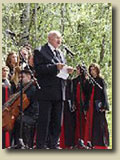 After
prayers for the victims in Donja Gradina, the group of 10,000
gathered citizens was addressed by Gojko Knezevic, a representative
of camp survivors, Dragoljub Ackovic of the World Congress of
Roma, and Republika Srpska president Dragan Cavic. A message from
Avner Shalev, the president of the Yad Vashem Memorial Center
in Jerusalem, was read by Arie Livne, the special representative
of the World Jewish Congress for the countries of the former Yugoslavia. After
prayers for the victims in Donja Gradina, the group of 10,000
gathered citizens was addressed by Gojko Knezevic, a representative
of camp survivors, Dragoljub Ackovic of the World Congress of
Roma, and Republika Srpska president Dragan Cavic. A message from
Avner Shalev, the president of the Yad Vashem Memorial Center
in Jerusalem, was read by Arie Livne, the special representative
of the World Jewish Congress for the countries of the former Yugoslavia.
The
message of the president of the Yad Vashem Memorial Center in
Jerusalem said that the lesson of the Holocaust should be a cultural
code for learning about human values, democracy, human rights,
patience and tolerance, and against racism and totalitarian ideas.
In
the message read by Arie Livne, who is also the director of the
Republika Srpska mission in Israel, Mr. Shalev also said that
the event in Donja Gradina and the work of the Yad Vashem Museum
in Jerusalem, as well as the activities of various centers throughout
the world, the work of teachers, researchers and public figures,
join into one powerful voice that promises that the past will
be remembered and interwoven deeply into our lives, and that it
will be the foundation for the future. “These voices join into
one so that we can ensure that the horrors that happened here
60 years ago will be eradicated from the model of human behavior
and from the European people,” said Mr. Shalev, who quoted from
the memoirs of Djuro Svarc, an engineer of Jewish origin who survived
Jasenovac: “If all the prisoners of the camp could join their
voices and their feeling of despair into one voice and one despair,
then the mountains would ring with the scream of horror of the
Judgment Day... because that was spectacle in the camp at that
time, while we were slaves in hell, and the purpose of the world
was different than what it is now. Thus all people who are former
prisoners stopped being individuals forever and became equals
among themselves because they deeply experienced and felt on their
own skin the satanic nature of man. The Nazis and their allies
wanted to exterminate the Jewish people from this earth. They
denied the universal values that the Jewish people gave to their
world on the foundations of which Western culture was established.
The Holocaust is the first and unprecedented attempt to exterminate
an entire people and an entire culture, that is, a people that
gave the world the idea of respect for life and the responsibility
of respecting humanity.”
Today’s
commemorative gathering in Donja Gradina was attended by numerous
guests from at home and abroad. In addition to domestic guests
including the speaker of the National Assembly of Republika Srpska,
Dusan Stojicic; the vice president of Republika Srpska, Ivan Tomljenovic;
the prime minister of Republika Srpska, Pero Bukejlovic, and the
chairman of the Bosnia and Herzegovina Presidency, Borislav Paravac,
the commemoration was also attended by Serbian president Boris
Tadic, Serbian justice minister Zoran Stojkovic, the ambassadors
of Serbia-Montenegro, Slovenia and China in Bosnia-Herzegovina,
as well as representatives from the missions of other embassies
in Bosnia-Herzegovina located in Banja Luka. The commemorative
gathering in Donja Gradina was also attended by the vice-president
of the Bosnia-Herzegovina Federation, Desnica Radivojevic, several
members of the Council of Ministers, including foreign affairs
minister Mladen Ivanic, and ministers from the Republika Srpska
government.
Church
bells in all Orthodox churches in Republika Srpska also marked
the beginning of the memorial academy “I seek pardon” in Donja
Gradina, the final event in the commemoration of the 60 year anniversary
of the break out of Jasenovac prisoners, the triumph over fascism
and the Holocaust. Approximately one hundred performers took part
in the program of the memorial academy, including actors from
the Republika Srpska National Theatre, the Republika Srpska Children’s
Theatre from Banja Luka, the members of the Braca Baruh Jewish
choir from Belgrade, the Jedinstvo choir and the Academy of Arts
Academic Orchestra from Banja Luka.
Republika
Srpska president Dragan Cavic, addressing those present in Donja
Gradina, emphasized that the perpetrators of the crime of Jasenovac
cannot be justified to anyone in any way and that the executioners
need to be punished each year – by remembrance. At the largest
killing field in the Jasenovac system of concentration camps,
where the Ustashe of Ante Pavelic brutally killed 366,000 Serbs,
Jews, Roma and antifascists, Mr. Cavic reminded that six decades
had passed from the crime committed on the territory of the Independent
State of Croatia (NDH) in World War II.
Source:
Republika Srpska Government

JASENOVAC
– DONJA GRADINA FACTORY OF DEATH 1941-1945
 On
the occasion of the 60-year anniversary of the break out of Jasenovac
concentration camp prisoners, victory over fascism and the Holocaust,
a CD-ROM has been published with an electronic library, film archive,
bibliography, data base of victims and recommended sources under
the title “Jasenovac – Donja Gradina Factory Of Death 1941-1945”. On
the occasion of the 60-year anniversary of the break out of Jasenovac
concentration camp prisoners, victory over fascism and the Holocaust,
a CD-ROM has been published with an electronic library, film archive,
bibliography, data base of victims and recommended sources under
the title “Jasenovac – Donja Gradina Factory Of Death 1941-1945”.
Published
by Svetlopisno Odelenje, the CD-ROM was prepared by Hieromonk
Jovan (Culibrk) with the assistance of Presbyter Dragoslav Topolac.
Sources for this CD-ROM include the Serbian Orthodox Church Museum,
the Victims of Genocide Museum, the documentary film “Jasenovac”
by Gustav Gavrin, courtesy of the Yugoslav Film Archive, archive
photographs of Jasenovac, courtesy of the Council on Jasenovac
of the Holy Synod of Bishops of the Serbian Orthodox Church, and
the World War II video archive of Svetlopisno Odelenje.

LITERARY
EVENING IN VINKOVCI
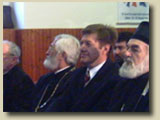 A
literary evening promoting the book of Dusan S. Vojvodic “Eminent
Serbs of the Vinkovci region” was held on April 17, 2005 in the
building of the Vila Serbian Singing Society in Vinkovci. Novi
Sad University professor Dusan Beric and Novi Sad Library director
Dragan Kojic spoke about the book, which discusses eminent Serbs
from Vinkovci and the surrounding region with a love of the truth. A
literary evening promoting the book of Dusan S. Vojvodic “Eminent
Serbs of the Vinkovci region” was held on April 17, 2005 in the
building of the Vila Serbian Singing Society in Vinkovci. Novi
Sad University professor Dusan Beric and Novi Sad Library director
Dragan Kojic spoke about the book, which discusses eminent Serbs
from Vinkovci and the surrounding region with a love of the truth.
The
program for this literary evening included the choir of the Diocese
of Osijek Polje and Baranja, which sang several spiritual compositions.
This spiritual and cultural event in Vinkovci before numerous
guests was also attended by His Grace Bishop Lukijan of Osijek
Polje and Baranja and the Serbia-Montenegro consul in Vukovar,
Ms. Bojana Ristic.
Protopresbyter
Predrag Azap

[Serbian
Translation Services]
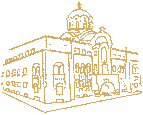
Copyright © 1999-2004 by
The Information Service of the Serbian Orthodox Church
11000 Belgrade
Kralja Petra I no.5
+381 11 3282 596
e-mail
|

